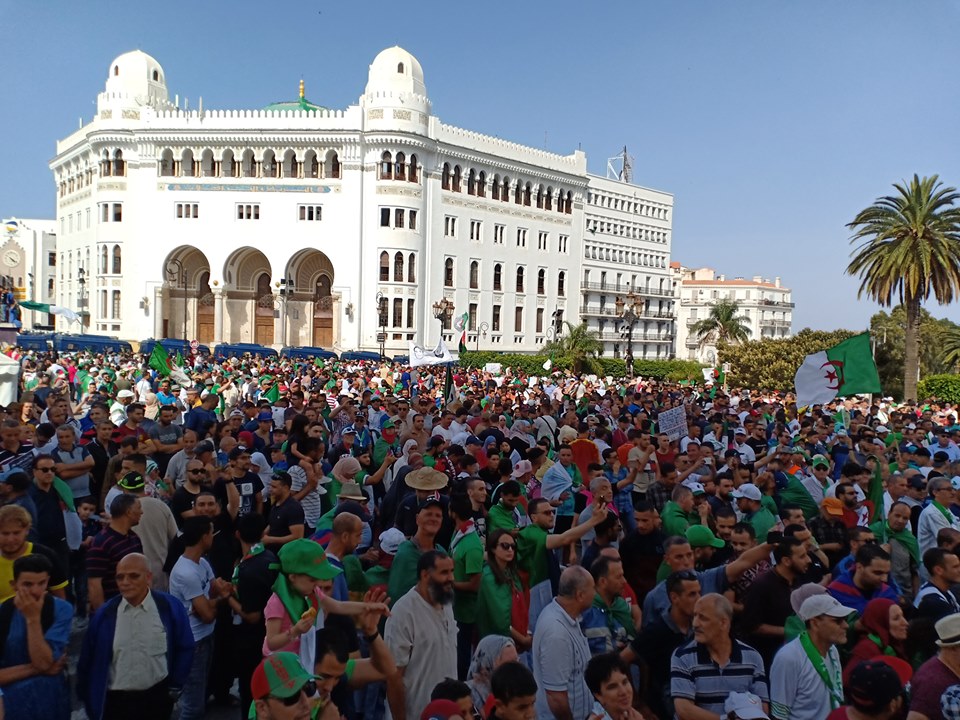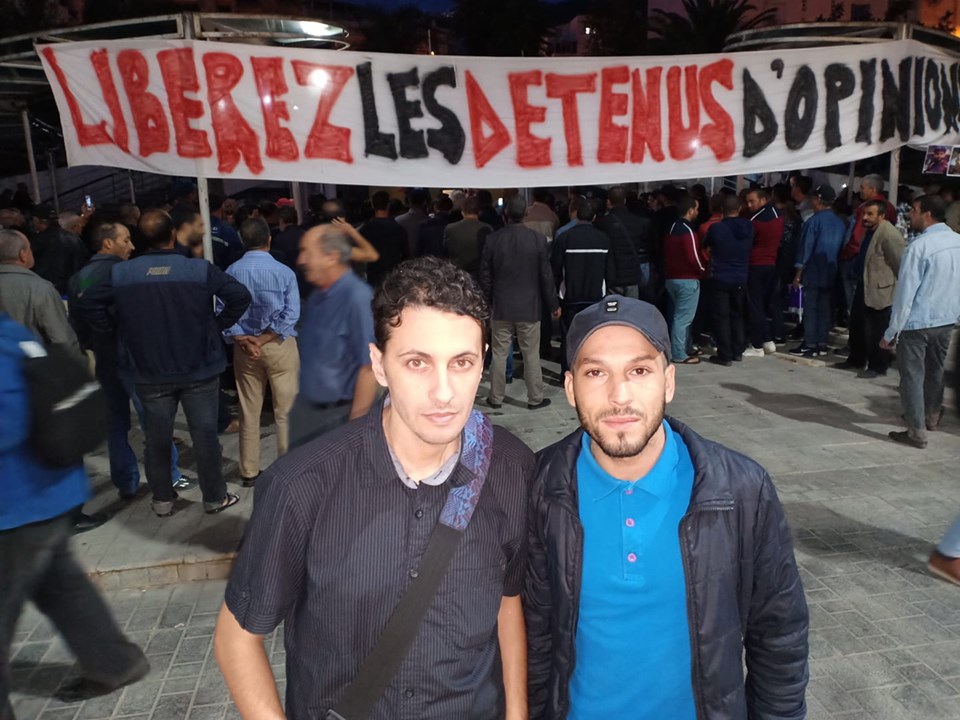Three weeks ago, as Abdelouahab Fersaoui left a sit-in in support of political prisoners outside the Sidi M’hamed tribunal in Algiers, he was detained by plainclothes police officers and taken by force to a police station.
Fersaoui is the president of the Youth Action Rally (RAJ), an organization advocating for cultural and human rights, which has become a target of state repression due to its involvement in the Hirak, the popular protest movement born in Algeria last February. The Hirak, which means movement, has so far forced Algeria’s longest ruling president Abdelaziz Bouteflika to step down. Mobilizations continue, demanding that the entire political class ruling the country resign.
The evening of his arrest, Fersaoui was transferred to the El Harrach prison. He was unable to reach a lawyer or to inform his family. While his whereabouts were unknown, his kidnapping was denounced on social media networks. It wasn’t until two days later that a lawyer, Aouicha Bakhti, revealed where Fersaoui was, after jailed activists she was visiting told her they’d seen him.
Fersaoui’s disappearance was the latest in a spate of attacks on activists pushing for change in Algeria. In less than a month, nine RAJ activists have been prosecuted on extremely serious charges, including harming national unity and inciting violence.

Even more disturbing is the fact that the cases against them are built on Facebook publications or slogans supporting the Hirak. Their arrests were carried by plainclothes officers in public, often in cafés and in broad daylight. The detainees were then disappeared into police stations and prisons for up to two days, until they reappeared to be brought to court and incarcerated.
In Algiers, the centre of political power in Algeria, mass protests continue as hundreds of thousands join marches every Tuesday and Friday. Authorities are doing all they can to silence dissidents and impose presidential elections, scheduled for December 12th. All of the politicians running for office are from the traditional political class, not one has connections to the Hirak. Protesters are demanding a period of transition. They claim there is no guarantee of free and fair elections, as Bouteflika’s departure in April left the same political class behind.
Though Abdelkader Bensalah is the interim president, Army Chief of Staff and vice-minister of defence General Ahmed Gaid Salah is the real strongman of the country, leading many to fear the installation of a military dictatorship. The pressure is on Gaid Salah to resign. One of their most recent slogans is: “Bye bye Gaid Salah! This year, there won’t be any vote!”
Since last June, out of at least a hundred people imprisoned for politically related motives, 85 reside in Algiers, according to the newly-created National Committee for the Liberation of Detainees (CNLD). Another thirteen have been detained since last March in Algiers, accused of destroying public property, according to Kaci Tansaout, the coordinator of the CNLD.
“I don’t believe in these elections. They’re just a waste of time. Opponents are in jail, in exile or marginalized,” said political cartoonist Ghilas Ainouche in an interview with Toward Freedom. “There’s [a possibility] of fraud. I don’t see elections in these conditions.”
In Algiers, all gatherings have been banned by decree since the Black Spring protests of 2001, preventing meetings and exchanges between activists and stifling the development of a civil society critical of power. Over the last eight months, authorities sometimes reacted to demonstrations with violence, using tear gas and water canons. However, due to the large mobilizations bringing millions of Algerians into the streets, the biweekly protests have largely been tolerated.
But when activists pushed for sit ins to occupy the city’s streets outside of the Tuesday and Friday demonstrations, they were repeatedly repressed and taken to police stations, only to be released a few hours later. In April, several female protesters shocked the public by saying they had been strip searched by a policewoman as a condition of their release.

After a period of relative calm for demonstrators, a wave of political detentions started last June. At first, Algerian authorities randomly targeted protesters holding Amazigh flags, a cultural and identity flag seen in demonstrations in the Maghreb region, which is not forbidden by any law. Nevertheless, Ahmed Gaid Salah declared no other flag other than the Algerian national one would be tolerated.
Then the state turned to the political actors at the forefront of the Hirak, those who openly refuse the regime’s political agenda. In September, police arrested Karim Tabbou, a spokesman of the Democratic and Social Union party (UDS) party, Fodil Boumala, a former journalist and political scientist and Samir Belarbi, an Islamist and active member of the Hirak.
As elections approach, approximately 100 people remain in jail, including three journalists, and an increasing number of protesters are being put on trial across Algeria. In recent weeks, the court hearing of Lakhdar Bouregaa, a veteran of the liberation war who has been in preventive detention since June 30, attracted media attention. Bouregaa, who is 86 years old, is accused of undermining the morale of the army after he openly supported the Hirak and criticized Ahmed Gaid Salah, refused to answer the judge’s questions.
In smaller cities, however, state repression has–at times–been countered. One protester, Djilali Aounit, 35, from the town of Timezrit, 40 km from Bejaia, was caught leaving a demonstration because he had brought his donkey. The following night, he was charged with attacking state institutions. But after an intense mobilization, with sit ins, numerous lawyers working on his behalf, and a heavy presence of supporters at court, he was granted bail and eventually released.
Surprisingly in such a repressive context, in Annaba, in eastern Algeria, a judge released Nadir Fertissi, a protester charged with attempting against territorial integrity who had been detained for a month. The judge ordered the police to give Fertissi back his flags. More recently, on October 13, three people were cleared of similar charges in the town of Sidi Belabbès.
“We must recognize that the Hirak has freed some people. Several people arrested in cities like Annaba or Chlef have been acquitted. That’s not the case in Algiers,” said Omar Farouk Slimani, a 34-year-old lawyer, in an interview with Toward Freedom. “These contradictory practices, especially concerning those who held the Amazigh flag or slogans against the system, like 22-year-old university student Yasmina Dahmani and elected representative Samira Messouci, are surprising.” Dahmani and Messouci remain in prison.
Despite these pockets of resistance, repression of another kind is taking root. Yanis Adjlia, a non partisan activist who organizes weekly sit ins in Bejaia to call for the liberation of political detainees in other cities, is undergoing judiciary harassment. He said he has received four complaints and has repeatedly been interrogated about affairs linked to his activism. “They’re trying to build a case against me,” he said.
Hadj Ghermoul, a 37-year-old activist from Mascara who has already spent six months in jail for sharing a picture with a sign against Bouteflika’s fifth mandate, said in an October 10 Facebook video that he had received a summons, without any written motive.

Cartoonist Aïnouche was witness to violent state repression in his native region of Kabylie during the Black Spring uprising in 2001. He also had his share of trouble due to his cheeky cartoons and drawings. Aïnouche was insulted, fired from his job, and physically threatened. Although his work seems as daring as ever, he says he is deeply concerned with the recent crackdown.
“Before, you could criticize the Pouvoir [the ruling class], and it was OK, even though you could have a few worries. Now if you say something, the next day you can end up in jail. The space of freedom is getting smaller and smaller,” said Aïnouche. “Our biggest fear following Bouteflika’s departure has been to end up saying: ‘It was better before he left.'”
Author Bio
Ilhem Rachidi is a freelance reporter based in Morocco. She has written extensively on protest movements and human rights issues, publishing articles in the French newspaper Mediapart (where she has worked as a correspondent for four years), Rue89, Al Monitor, The Christian Science Monitor, and Foreign Policy.
